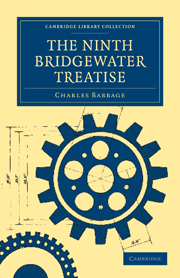Book contents
- Frontmatter
- Contents
- Preface
- Title in the Series
- CHAPTER I Nature of the Argument
- CHAPTER II Argument in favour of Design from the changing of Laws in Natural Events
- CHAPTER III Argument to show that the Doctrines in the preceding Chapter do not lead to Fatalism
- CHAPTER IV On the Account of the Creation, in the First Chapter of Genesis
- CHAPTER V Further View of the same Subject
- CHAPTER VI Of the Desire of Immortality
- CHAPTER VII On Time
- CHAPTER VIII Argument from Laws intermitting—on the Nature of Miracles
- CHAPTER IX On the permanent Impression of our Words and Actions on the Globe we inhabit
- CHAPTER X On Hume's Argument against Miracles
- CHAPTER XI À priori Argument in favour of the Occurrence of Miracles
- CHAPTER XII Thoughts on the Nature of Future Punishments
- CHAPTER XIII Reflections on Free Will
- CHAPTER XIV Thoughts on the Origin of Evil
- CONCLUSION
- APPENDIX
- CORRECTIONS
CHAPTER IX - On the permanent Impression of our Words and Actions on the Globe we inhabit
Published online by Cambridge University Press: 05 October 2010
- Frontmatter
- Contents
- Preface
- Title in the Series
- CHAPTER I Nature of the Argument
- CHAPTER II Argument in favour of Design from the changing of Laws in Natural Events
- CHAPTER III Argument to show that the Doctrines in the preceding Chapter do not lead to Fatalism
- CHAPTER IV On the Account of the Creation, in the First Chapter of Genesis
- CHAPTER V Further View of the same Subject
- CHAPTER VI Of the Desire of Immortality
- CHAPTER VII On Time
- CHAPTER VIII Argument from Laws intermitting—on the Nature of Miracles
- CHAPTER IX On the permanent Impression of our Words and Actions on the Globe we inhabit
- CHAPTER X On Hume's Argument against Miracles
- CHAPTER XI À priori Argument in favour of the Occurrence of Miracles
- CHAPTER XII Thoughts on the Nature of Future Punishments
- CHAPTER XIII Reflections on Free Will
- CHAPTER XIV Thoughts on the Origin of Evil
- CONCLUSION
- APPENDIX
- CORRECTIONS
Summary
The principle of the equality of action and reaction, when traced through all its consequences, opens views which will appear to many persons most unexpected.
The pulsations of the air, once set in motion by the human voice, cease not to exist with the sounds to which they gave rise. Strong and audible as they may be in the immediate neighbourhood of the speaker, and at the immediate moment of utterance, their quickly attenuated force soon becomes inaudible to human ears. The motions they have impressed on the particles of one portion of our atmosphere, are communicated to constantly increasing numbers, but the quantity of motion measured in the same direction receives no addition. Each atom loses as much as it gives, and regains again from others, portions of those motions which they in turn give up.
The waves of air thus raised, perambulate the earth and ocean's surface, and in less than twenty hours every atom of its atmosphere takes up the altered movement due to that infinitesimal portion of the primitive motion which has been conveyed to it through countless channels, and which must continue to influence its path throughout its future existence.
But these aerial pulses, unseen by the keenest eye, unheard by the acutest ear, unperceived by human senses, are yet demonstrated to exist by human reason; and, in some few and limited instances, by calling to our aid the most refined and comprehensive instrument of human thought, their courses are traced and their intensities are measured.
- Type
- Chapter
- Information
- The Ninth Bridgewater Treatise , pp. 109 - 117Publisher: Cambridge University PressPrint publication year: 2009First published in: 1837



